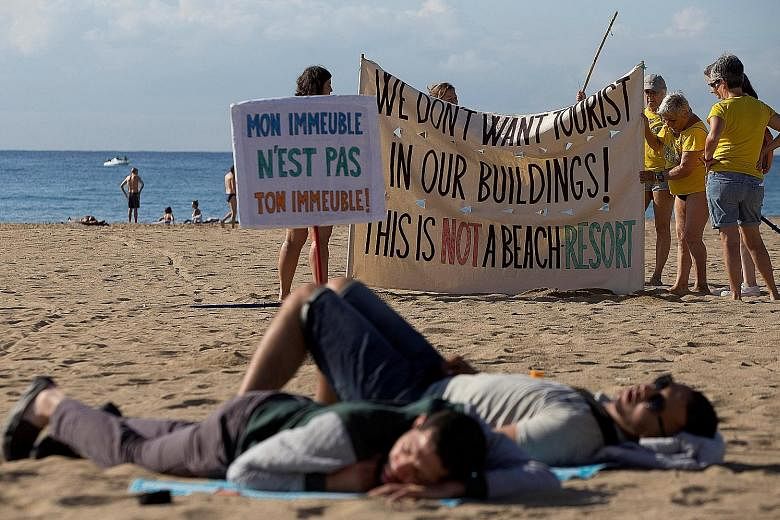An unusual series of advertisements by Airbnb appeared recently in Berlin: Rather than seeking to entice tourists to book lodgings through the homesharing website, they were targeted at the German capital's political class.
"My district is open to all. Why not homesharing?" read one, which features a photograph of a man identified as Jairo, 59, a homesharer and tour guide.
The campaign is part of an effort by the website to push back against restrictions imposed by the Berlin authorities against homesharing.
In the German capital, as well as across Europe's top tourist draws - Amsterdam, Barcelona and Paris - websites like Airbnb have become a political issue.
Although they have helped drive tourism by opening up more affordable lodging options to travellers, critics say they are also posing a threat to the traditional hotelier business, changing the fabric of neighbourhoods and upending the property market.
Hotels are complaining that their market share is being eroded, while neighbours of homesharers eye the constant comings and goings in their buildings warily, some fed up with the din made by late-partying guests and others frustrated by the mess left in common areas.
The authorities are also watching the impact on the property market, as speculators move in to snap up apartments for short-term lets rather than taking long-term tenants, causing rental rates to rise and exacerbating a housing shortage.
After a plan for a blanket ban on private short-term lets of apartments failed at the courts, the Berlin authorities put forward a new proposal last week to force homesharers to register and to limit short-term lets to 60 days in a year.
The measure aims to dissuade people from going into the business of buying apartments to let out via such websites. It includes the possibility that government-appointed trustees will be sent to take charge of properties that are left empty for more than three months.
"We don't want to punish anyone who lets out their apartments for a few days as a holiday home. But we want to take more decisive action against a more long-term commercial use," said Ms Katrin Lompscher, Berlin's senator for city development and housing.
The consequences of failing to meet the housing needs of locals and managing sustainable tourism flows can be serious. In the district of Kreuzberg, tensions are rising.
Once a working-class neighbourhood on the West Berlin border, Kreuzberg has become one of the capital's most sought-after postcodes, following the fall of the Wall, due to its location at the heart of the reunified capital as well as for its vibrant music and art scene.
A five-star hotel built at one of the most iconic junctions of the district has become the latest symbol of gentrification, sparking fierce protests, with demonstrators bearing banners reading: "A luxury hotel means rising rents and prices."
Its windows have been smashed on at least two occasions since its opening in August, while across the district, dozens of properties hung campaign slogans to show their disapproval of their new neighbour.
"Sure, tourism creates jobs, but Berliners have to be able to afford to live in their own city too," said retiree Sabine Weiss, a resident in the district.
A similar story has played out in Spain's Barcelona, which has been hit by anti-tourist protests in recent months. "Tourists go home" read some slogans sprayed on buildings. Banners on others read: "We don't want tourists in our buildings."
After months of dispute with the authorities, Airbnb in July agreed to take down adverts for apartments that are not on an official register.
Likewise in the French capital, Paris, which is demanding that Airbnb remove offers that do not have a registration number, a requirement that came into force on Dec 1. It has a team of agents checking whether properties are being let out for more than the limit of 120 days a year - a restriction that the city is looking at tightening further.
Paris is one of the biggest markets for homesharing websites, with some 100,000 advertisements across platforms.
Underlining the impact of such online portals on the residential market, Mr Ian Brossat, the city's official in charge of lodgings, told French media: "Over the last five years, the city of Paris has lost 20,000 lodgings, which have been transformed into furnished apartments for tourists, to the detriment of housing and the Parisian middle class. The aim is to stop this haemorrhage."
Over in Amsterdam, where private apartment lets are already limited to 60 nights, questions surrounding tourism and the impact of online portals have become a topic in next year's local polls.
The Labour Party, which is in opposition in the Dutch city, wants to ban homesharing sites like Airbnb.
Such vacation rentals are simply untenable for the city, said the party's Amsterdam leader, Ms Marjolein Moorman.
"The costs that the city has to bear, including on enforcement, dealing with the nuisance, the increasingly filthy streets and the loss of social cohesion, all that's too much. More and more people feel that Amsterdam is no longer their city," she told De Telegraaf.

